Unfassbar schnell: Neuer 100m-WR: 9,72
Seite 12 von 13 Neuester Beitrag: 15.08.16 23:34 | ||||
| Eröffnet am: | 01.06.08 20:18 | von: sportsstar | Anzahl Beiträge: | 323 |
| Neuester Beitrag: | 15.08.16 23:34 | von: sportsstar | Leser gesamt: | 21.100 |
| Forum: | Talk | Leser heute: | 7 | |
| Bewertet mit: | ||||
| Seite: < 1 | ... | 7 | 8 | 9 | 10 | 11 | | 13 > | ||||
Schon nicht ganz schlecht für so nen 3 Millionen Inselstaat...
Gruß
Talisker
Source: http://www.sportsscientists.com/2009/08/analysis-of-bolts-958-wr.html
Analysis of Bolt's 9.58 World Record
As promised, as soon as the results and split times from Bolt's unbelievable 9.58s performance were available, we'd be analysing them
Turns out they became available rather quickly (not 9.58s kind of quick, but quick nevertheless). So here is the analysis of Bolt's race.
All the splits
First of all, here is the table published by the IAAF this morning, containing all the splits and times for 20m intervals, for both the semi-final and final: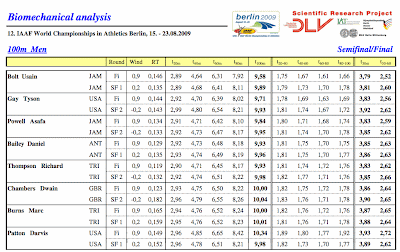 Next up, some graphs to highlight certain things a little better. Below is a graph showing the 20m interval times for the top 3: Bolt-Gay-Powell
Next up, some graphs to highlight certain things a little better. Below is a graph showing the 20m interval times for the top 3: Bolt-Gay-Powell
It reveals how Bolt achieved the fastest split at all intervals, which is amazing considering his supposed slow start. He led the race at 20m, and continued to grow that lead. I have shown his times on the chart: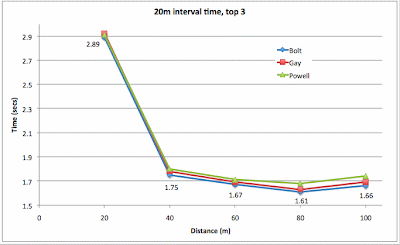
The relatively slow first 20m (because of the start) makes interpreting the last 80m of the race quite difficult, so I've taken the liberty of looking only at the last 4 intervals, for a more obvious comparison between Bolt, Gay and Powell. It makes the point that Bolt was dominant from start to finish, as shown below.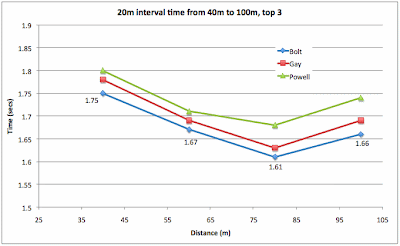
Translating those times into speeds is a simple but interesting exercise (shown in the graph below), because you then perceive just how fast the top end speed is. For Bolt, the fastest interval (60m to 80m) was run at an average speed of 44.72km/hour. If you're wondering how that compares to last year in Beijing, read on...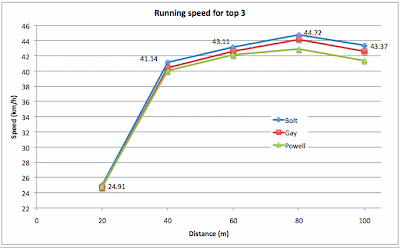
The next graph shows the gap between Bolt and Gay and Powell for each 20m interval. I felt this would be interesting to look at because it would show whether Bolt did all the damage early and then held the lead, or whether he grew the margin progressively through the race. It turns out to be the latter option - he builds a lead at each interval. It's 0.03s/20m for the first 40m (over Gay, that is), and then Gay makes something of a comeback (but never actually closes the gap, he just limits its growth), before losing another 0.03 seconds in the final 20m.
For Powell, the margin grew steadily throughout the race, and opened up at an increasing rate after 60m. The comparison is interesting because it serves to highlight:
a) How incredible Bolt was, from start to finish of the race - who'd have thought he'd lead at 20m?
b) How well Gay did to hold onto Bolt as much as he did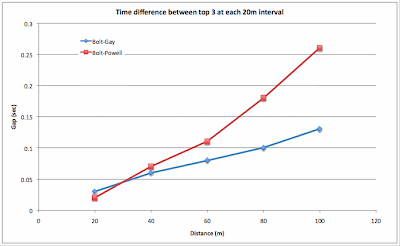
A comparison between Berlin and Beijing
Now, for the comparison everyone has been making already - how does Berlin 2009 compare to Beijing 2008?
I must confess that I'm a little skeptical of the Beijing figures - at the time, there was some contention about the accuracy of these splits, because they were worked out from TV footage, whereas the latest Berlin result is a very specific research study, and thus (you'd think), more accurate. However, it's an interesting comparison, but just keep in mind that there may be some error in the Beijing numbers (you'll see what I mean below)
First the split times. I've looked at Bolt in Berlin, Bolt in Beijing, and then Gay in Berlin as well.
What it shows is that Bolt's first 20m in Berlin was actually slower than his first 20m in Beijing (now you see why I'm skeptical). Anyone who saw last night will testify that Bolt started brilliantly in Berlin, and so I can't believe he was slower to 20m. However, from then on, he's faster, and by 60m, is 1/100th of a second ahead of "himself in Beijing", then four hundreths by 80m, and adds another 0.09s to that gap in the final 20m.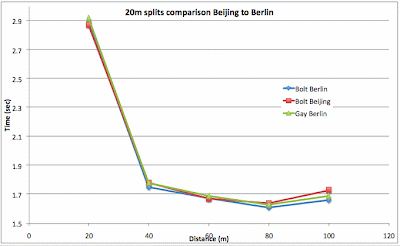
As for the Berlin Top 3 comparison, here are the gaps at each 20m marker, but this time Bolt's performance in Beijing has been added (in green). Positive numbers mean Bolt is ahead (as was the case the whole way in Berlin!) and negative means behind, as the splits suggest for 20m compared to his Beijing run. So Bolt was behind at 20m (by 0.02s), slightly ahead at 40m, then grew the lead, to 0.04s at 80m, and ended up 0.11 seconds ahead of his Beijing time at the finish line.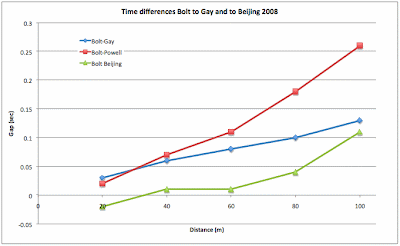
Once again, here are the speeds based on the available times - they show that Bolt in Berlin hit a higher speed at 60 to 80m than in Beijing. I've indicated Bolt's speeds on the graph, and the smaller number at each point is the speed of Tyson Gay, just for comparison purposes.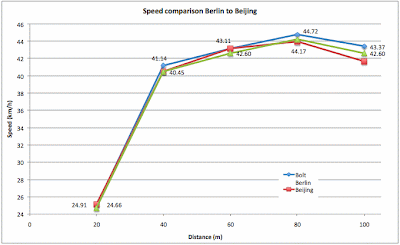 So I suppose the question is: Does this prove that Bolt lost 0.07s by slowing down in Beijing, since this was the difference over the last 20m? The answer - of course not, no. His last 20m in Berlin was 0.07s faster than in Beijing, but he had reached a higher peak speed at 80m (well, strictly, it's his average from 60m to 80m that is higher), and so the degree to which he increased his "lead" over his Beijing performance is a little exaggerated - it's not an equal comparison because the starting value is greater. Therefore, I would still argue that he only lost about 0.03 to 0.05 seconds in Beijing as was written at the time, based on the assumption that at best, he'd have kept going at the same speed (this is best case scenario).
So I suppose the question is: Does this prove that Bolt lost 0.07s by slowing down in Beijing, since this was the difference over the last 20m? The answer - of course not, no. His last 20m in Berlin was 0.07s faster than in Beijing, but he had reached a higher peak speed at 80m (well, strictly, it's his average from 60m to 80m that is higher), and so the degree to which he increased his "lead" over his Beijing performance is a little exaggerated - it's not an equal comparison because the starting value is greater. Therefore, I would still argue that he only lost about 0.03 to 0.05 seconds in Beijing as was written at the time, based on the assumption that at best, he'd have kept going at the same speed (this is best case scenario).
There is a lot more to be said, I unfortunately have a pressing deadline, so I'll have to say it later!
Until then, thanks for the comments!
Ross
P.S. One thing I didn't mention in the original post (and should have) is the difference in wind speed between Beijing (0.0m/s) and Berlin (0.9m/s tailwind). So here is a comment from Rob, which pretty much summarizes the impact:
One thing that I think needs mentioning is the effect of the tailwind, which was 0.9 m/s in Berlin and 0 m/s in Beijing. This might account for why Bolt/Gay in Berlin had higher top speeds than Bolt in Beijing -- at least based on your graph results (the other factor is the Bolt might have already started celebrating before the 80m mark in Beijing!).
Secondly, if we adjust for the affect of the 0.9m/s tail wind [Ross: this depends a little on which 'formula' you use to adjust for win, but it illustrates the point well enough, and the numbers are about right], Bolt would have run 9.62 instead of 9.58, which isn't much different than a possible 9.64 in Beijing had he run through the finish line. Tyson Gay's adjusted time in Berlin would have been 9.75.
Erst Siegesjubel, dann Panik. Bei der Leichtathletik-WM in Berlin lagen die Testergebnisse der 100-Meter-Sprinter noch gar nicht vor, da kursierten bereits Gerüchte über nachgewiesenes Doping. Zu gering ist das Vertrauen in den Weltverband IAAF - die Vorwürfe gegen die Organisation wiegen schwer.
weiter: http://www.spiegel.de/sport/sonst/0,1518,643489,00.html
Die Sportler "wissen" welche Präparate nachweisbar sind (Urin und Blut) und welche nicht. Wer sich erwischen lassen würde, sei dumm.
Bei dem einen wirkt ein Präparat mehr als bei dem anderen weniger. Ein Trainingspartner sagte mal zu ihm, er nehme die 3fache Dosis des Mittels XY, habe allerdings keine spürbare Wirkung, hingegen nimmt ein anderen die einfache Dosis und dies hätte starke Auswirkungen.
Er meinte, die Verbände sind total korrupt. Ben Johnson hätte man auffliegen lassen können, da er der Bad Guy war und es den Good Guy gab (Name habe ich vergessen), aber wenn Bolt positiv geprüft würde, würde man dies unter den Tisch fallen lassen, da es dem Sport zu stark schaden würde, schließlich ginge es hier um GELD! (Das könnte er sich sehr gut vorstellen)
Soweit mal ein kleiner Einblick eines Insiders...
Das einzige was helfen würde wären regelmässige unangemeldete Kontrollen bei allen Sp(r)itzensportlern. Ist ja aber leider nicht umsetzbar. Aber solange haben die Topleute für mich allesamt Dreck am Stecken. Oder eben Doping freigeben, dann haben auch alle die gleichen Chancen.
aber egal.
So wird die Möglichkeit all jene Sportler z.B. aus afrikanischen Ländern,die vor der WM nicht getestet wurden oder nicht getestet werden "konnten" (Labortechnisch wegen der Hitze in den entsprechenden Ländern...),vor den Wettkämpfen und danach zu testen nicht ausgeschöpft.
Labortechnisch nicht zu begründen und auch nicht finanziell,da der geschätzte Aufwand bei ca. 30.000 € insgesamt läge,
das Thema Doping bleibt problematisch,nicht nur des Dopings selbst wegen.
"...Na dazu braucht man nun wirklich kein Insider zu sein..." Nun ist es etwas anderes ob man es annimmt oder ob es jemand aus dem Metier bestätigt.
"...Das einzige was helfen würde wären regelmässige unangemeldete Kontrollen bei allen Sp(r)itzensportlern..." Nicht unbedingt, da viele Mittel im Urin gar nicht feststellbar sind.
"...Ist ja aber leider nicht umsetzbar..." Er meinte doch, dies würde nur etwas mehr Geld kosten. Aber sind die Offiziellen daran überhaupt erpicht an diesen Kontrollen? ;-)
"...Aber solange haben die Topleute für mich allesamt Dreck am Stecken..." So würde ich es auf keinen Fall ausdrücken, weil...
"...Oder eben Doping freigeben, dann haben auch alle die gleichen Chancen..." Das war auch meine ähnliche Frage, ob überhaupt Chancengleichheit bei den jetzigen Bedingungen herrschen? Er sagte ja, den alle würden ja "nachhelfen". Bolt hätte z. B. als 14/15 jähriger schon fast alle Wettkämpfe gewonnen, er sei also schon damals eine Rakete gewesen. Nur eine 9,72 wäre er nicht ohne Doping gelaufen, gewonnen hätte er trotzdem, wenn keiner Doping anwenden würde. Die genetische Disposition und das Training sind ausschlaggebend. Nur weil jemand Mittelchen nimmt, wird er kein Spitzensportler!
Und das Doping einfach zu verurteilen, sei etwas kurz gedacht. Er sagte, wenn er durch Doping eine 9,9x laufen könnte, würde er sehr wohl darüber nachdenken zu dopen, denn schließlich ließe sich hiermit sehr viel Geld verdienen. Bolt bekomme im Jahr etliche Millionen. Das größte Risiko dabei ist aber, das die Gesundheit sehr stark dabei leiden kann (oder leidet). Den Weltrekord bei den Damen aufgestellt von Florence Griffith-Joyner würde so schnell keine Frau schlagen, aber sie sei schon mit 38 Jahren gestorben, habe also nicht viel davon gehabt...
Wer allerdings bei einer Kreismeisterschaft dopen würde sei sehr dumm.
Du wirst sicherlich verstehen, daß ich keine Angabe hier im Internet schreibe, die größere Rückschlüsse auf die Person zulassen. Weltmeister im Kirschkernweitspucken ist er nicht, dafür hatte er aber einen weit durchtrainierteren Body als Dein Avatar.
Es ist sehr intelligent Postings und Aussagen zu hinterfragen und anzuzweiflen, auch meine. Natürlich obliegt es jedem selbst diese zu "glauben" oder nicht. Ich als Laie kann mir vieles vorstellen, aber es ist schon sehr interessant, wenn ein Insider aus dem Nähkästchen plaudert. Wenn Du mich zitierst, dann bitte nicht nur einen Halbsatz sondern ganz: "...Er sagte er sei sich zu 100% sicher, daß ALLE Sportler gedopt seien..." Wie ich es schon geschrieben habe, so kann ich (und er) es nicht belegen! Kann man auch sehr schlecht, da wohl keiner offiziell eine ehrliche Stellung dazu abgibt.
Zu glauben im Spitzensport (auch im Mannschaftssport) würde nicht gedopt, ist gelinde gesagt etwas naiv.
Und Doping hat nicht nur etwas mit Muskelaufbau zu tun. Sofern ich das richtig verstanden habe geht es hier auch um Regenation nach Verletzungen, verringerten Muskelabbau, Ruhigstellung von Sportschützen (ruhigere Hand), etc. Aber hier bin ich nicht firm genug, gebe nur das wieder, was er mir gesagt hat.
Wie welches Mittel wirkt, was nachweisbar ist und nicht, da habe ich nicht nach gefragt.
Eine Frage habe ich ihm aber noch gestellt, welche Zeiten ein Mensch laufen würde ohne Doping. Er sagte eine 9,9x sei für besonders Begabte schon möglich. Harry (?) sei damals auf der Aschenbahn Handgestoppt eine 10,0 gelaufen...
Auch ich habe einige...zudem kenne ich aufgrund meines Sportstudiums und meines damals leistungsmäßig betriebenen Sports zahlreiche Profiathleten. Doch da ist mri durch die Bank weg aufgefallen, dass sich Meinungen in puncto "flächendeckendem" Doping durchaus unterscheiden.
Und dass es zig Varianten von doping gibt, sprich der Begriff "Doping" nur ein Überbegriff für alles mögliche ist, habe ich schon bis zum Erbrechen hier erläutert. Evtl. schaust du dir dazu auch mal den Thread von mir an:
http://www.ariva.de/Doping_im_Sport_t338167
ansonsten habe ich zu dem Thema eigentlich mittlerweile an unterschiedlichster Stelle schon alles gesagt, weshalb ich es auch als eher müsig erachte, all dies nochmal zu wiederholen.
Dennoch, nichts für ungut und Danke für deine Beteiligung und Erfahrungsberichte hier im Thread.
Aber der Aspekt ist gar n icht mal verkehrt...kann die von dir gemeinten Gründe haben, jedoch auch wirklich rein ästhetische *g*